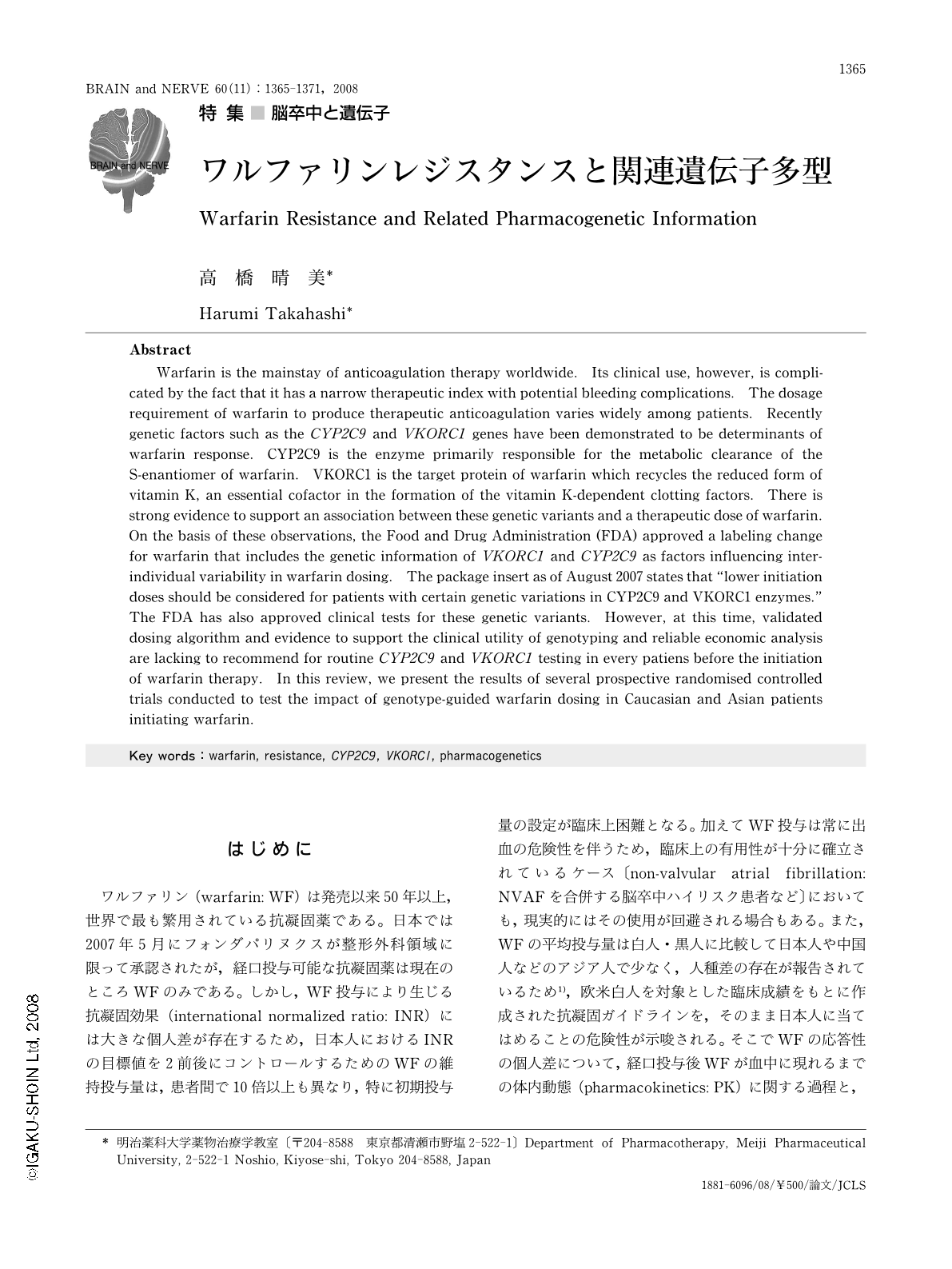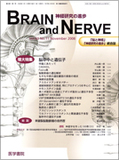Japanese
English
- 有料閲覧
- Abstract 文献概要
- 1ページ目 Look Inside
- 参考文献 Reference
はじめに
ワルファリン(warfarin: WF)は発売以来50年以上,世界で最も繁用されている抗凝固薬である。日本では2007年5月にフォンダパリヌクスが整形外科領域に限って承認されたが,経口投与可能な抗凝固薬は現在のところWFのみである。しかし,WF投与により生じる抗凝固効果(international normalized ratio: INR)には大きな個人差が存在するため,日本人におけるINRの目標値を2前後にコントロールするためのWFの維持投与量は,患者間で10倍以上も異なり,特に初期投与量の設定が臨床上困難となる。加えてWF投与は常に出血の危険性を伴うため,臨床上の有用性が十分に確立されているケース〔non-valvular atrial fibrillation: NVAFを合併する脳卒中ハイリスク患者など〕においても,現実的にはその使用が回避される場合もある。また,WFの平均投与量は白人・黒人に比較して日本人や中国人などのアジア人で少なく,人種差の存在が報告されているため1),欧米白人を対象とした臨床成績をもとに作成された抗凝固ガイドラインを,そのまま日本人に当てはめることの危険性が示唆される。そこでWFの応答性の個人差について,経口投与後WFが血中に現れるまでの体内動態(pharmacokinetics: PK)に関する過程と,WFが血中に現れてから抗凝固効果(international normalizedRatio:INR)を発現するまでの感受性(pharmacodynamics: PD)に関する過程に分けて,それぞれの過程に関わる影響因子について,日本人を含むアジア人,白人,黒人という異なる遺伝的背景,環境因子を有する患者を対象に,さまざまな研究が報告されている1,2)。それらの検討の結果,WFの応答性を決定する体内動態と感受性の個人差には,それぞれの過程に関与する異なる遺伝子変異が大きく影響していることが明らかにされた1,2)。本稿ではWFの投与量の個人差,特にレジスタンスに関連すると考えられる体内動態と,感受性に関わる変動因子も含めてretrospective,並びにprospective研究成果について,現在までに明らかになっている知見を紹介したい。
Abstract
Warfarin is the mainstay of anticoagulation therapy worldwide. Its clinical use,however,is complicated by the fact that it has a narrow therapeutic index with potential bleeding complications. The dosage requirement of warfarin to produce therapeutic anticoagulation varies widely among patients. Recently genetic factors such as the CYP2C9 and VKORC1 genes have been demonstrated to be determinants of warfarin response. CYP2C9 is the enzyme primarily responsible for the metabolic clearance of the S-enantiomer of warfarin. VKORC1 is the target protein of warfarin which recycles the reduced form of vitamin K,an essential cofactor in the formation of the vitamin K-dependent clotting factors. There is strong evidence to support an association between these genetic variants and a therapeutic dose of warfarin. On the basis of these observations,the Food and Drug Administration (FDA) approved a labeling change for warfarin that includes the genetic information of VKORC1 and CYP2C9 as factors influencing inter-individual variability in warfarin dosing. The package insert as of August 2007 states that "lower initiation doses should be considered for patients with certain genetic variations in CYP2C9 and VKORC1 enzymes." The FDA has also approved clinical tests for these genetic variants. However,at this time,validated dosing algorithm and evidence to support the clinical utility of genotyping and reliable economic analysis are lacking to recommend for routine CYP2C9 and VKORC1 testing in every patiens before the initiation of warfarin therapy. In this review,we present the results of several prospective randomised controlled trials conducted to test the impact of genotype-guided warfarin dosing in Caucasian and Asian patients initiating warfarin.

Copyright © 2008, Igaku-Shoin Ltd. All rights reserved.


